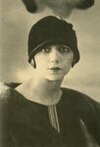Marika Kotopouli
| Marika Kotopouli | |
|---|---|
 |
|
| Born | 3 May 1887 Athens, Greece |
| Died | 11 September 1954 (aged 67) Athens, Greece |
| Occupation | Actress |
| Spouse(s) | Georgios Helmi (m. 1923-19??) |
Marika Kotopouli (Greek: Μαρίκα Κοτοπούλη; 3 May 1887 – 11 September 1954) was a Greek stage actress during the first half of the 20th century.
Kotopouli was born on 3 May 1887 in Athens, to Dimitris and Eleni. Her parents were also actors, and Marika's first stage appearance came during one of their tours, in the play "The Coachman of the Alps". She made her official debut in the Royal Theatre in 1903, before going to Paris in 1906 for theatrical studies.
From 1908, she had her own troupe, and theatre, the "Kotopouli Theatre". In this period she developed an intense artistic rivalry with another young actress, Kyveli. The two had very devoted fans, and during the National Schism, their rivalry acquired political overtones also: whilst Kyveli was favoured by the Venizelists, Kotopouli became a symbol of the royalist camp. In 1912 Kotopouli also had a personal love relationship with Ion Dragoumis, who became a major opponent of the Venizelists and was eventually assassinated. Kotopouli and Kyveli collaborated in joint productions from 1932–1934 and again from 1950-52.
She married Georgios Helmi in 1923. Later, with Spyros Melas and Dimitris Myrat, she co-founded and participated in the "Free Scene" (Ελεύθερη Σκηνή, June 1929 to spring 1930), before embarking on a tour of the United States. In 1933, she played in her only movie, the Greek-Turkish production Bad Road, based on a novel by Grigorios Xenopoulos. A new theatre, the Rex, was built specifically for her troupe in Panepistimiou Street in central Athens in 1936. It still stands, as the Rex/Kotopouli theatre, and functions as a branch of the National Theatre of Greece. Her repertoire included many classic plays, both ancient Greek and modern ones, ranging from Aeschylus to Goethe and Ibsen.
...
Wikipedia
